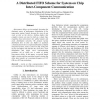402 search results - page 17 / 81 » Optimal clock synchronization in networks |
ISLPED
2003
ACM
14 years 27 days ago
2003
ACM
A significant fraction of the total power in highly synchronous systems is dissipated over clock networks. Hence, low-power clocking schemes would be promising approaches for futu...
CSREAESA
2004
13 years 9 months ago
2004
Interconnect delays are increasingly becoming the dominant source of performance degradation in the nano-meter regime, largely because the wires do not scale as fast as the device...
SIGMETRICS
1998
ACM
13 years 7 months ago
1998
ACM
We discuss the problem of detecting errors in measurements of the total delay experienced by packets transmitted through a wide-area network. We assume that we have measurements o...
INFOCOM
2009
IEEE
14 years 2 months ago
2009
IEEE
Abstract—In wireless sensor networks, asynchronous sleepwake scheduling protocols can significantly reduce energy consumption without incurring the communication overhead for cl...
GECCO
2005
Springer
14 years 1 months ago
2005
Springer
The clock signal and clock skew become more and more important for the circuit performance. Since there are salient shortcomings in the conventional topology construction algorith...

